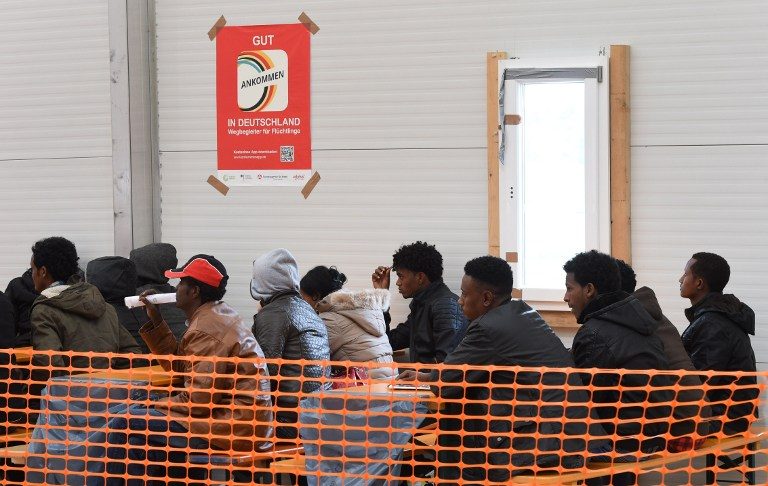SUMMARY
This is AI generated summarization, which may have errors. For context, always refer to the full article.

BERLIN, Germany – Germany said on Wednesday, January 11, that migrant arrivals dropped by two-thirds in 2016 from the previous year’s record high, providing relief for Chancellor Angela Merkel ahead of this year’s elections.
Merkel had taken heavy criticism after her open-door policy aimed at desperate Syrian refugees brought 890,000 asylum seekers to Europe’s biggest economy in 2015, contributing to the rise of an anti-migrant movement.
But last year that figure dropped back sharply, to 280,000 arrivals the government said, largely due to the closure of the Balkan overland route and a fragile EU-Turkey deal to limit the mass influx.
“We have managed to bring order to the migrant situation,” said Interior Minister Thomas de Maiziere, presenting the figures.
The sharply lower intake, he said, “shows that the measures which the German government and the European Union have taken are working”.
Last year, the EU reached a deal with Ankara, spearheaded by Germany, to stop the migrant influx to the Greek islands in return for aid and eased visa rules for Turkish citizens.
Berlin has also declared some Balkan states “safe countries of origin”, making it harder for their citizens to obtain refugee status, and Merkel hopes to do the same for Morocco, Tunisia and Algeria.
The migration office said that last year it dealt with about 745,000 asylum requests, mostly working through a massive backlog from the chaotic second half of 2015.
Of these, 36% were from Syria, 17% from Afghanistan and 13% from Iraq.
‘Most inhumane way’
While many Germans at first greeted the refugees and mobilized a huge volunteer effort, the mood darkened as the total rose to top 1% of the national population in a single year.
Hate crimes against refugee shelters spiked and the right-wing populist Alternative for Germany (AfD) party gained support, now polling at about 15%.
Public fears have been further stoked by several jihadist attacks committed by asylum seekers – worst of all the December 19 Berlin Christmas Market truck rampage that killed 12 people.
The suspect – Tunisian Anis Amri, who was later shot dead by Italian police – came to Europe years ago on a refugee boat, and managed to evade German authorities by using at least 14 different identities, officials later admitted.
Merkel, who is seeking a fourth term in an election expected in September, has faced harsh criticism over the mass influx, including from within her own conservative ranks.
Yet, as arrivals have eased off, her poll ratings have recovered, and she currently faces no obvious challengers within her ranks.
On Monday, January 9, Merkel praised the EU-Turkey deal and efforts to protect the bloc’s external borders, but complained that few EU members were willing to accept more refugees.
“We also need to share responsibility when it comes to our humanitarian obligations,” she said. “The European Union is still very much lacking in this at the moment.
“If some say ‘we don’t take anyone seeking shelter at all’, then to me this is not a sign of a functioning Europe.”
De Maiziere said Berlin was still seeking an EU-wide quota-based system for accepting refugees.
“Right now the decision of who gets to Europe is not taken by the EU but by criminal human traffickers,” he said.
“And it is highly dependent on the size of the wallet of the refugee who has to pay the criminal people smugglers. That’s the most inhumane way to take a decision.”
In one case early on Wednesday, police detained two Pakistani nationals – one near the German the city of Erfurt, the other in the Italian port of Ancona – for alleged human trafficking, German prosecutors said.
They were accused of having brought mostly Pakistani nationals via the Balkan route to Germany and of having unlawfully detained two asylum seekers in a bid to extort money out of their relatives abroad. – Rappler.com
Add a comment
How does this make you feel?
There are no comments yet. Add your comment to start the conversation.